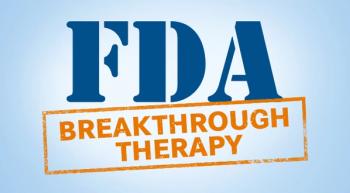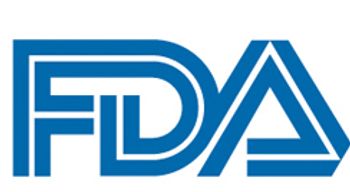Articles by Gina Columbus

The FDA has expanded the approval for pembrolizumab (Keytruda) monotherapy for the frontline treatment of patients with stage III non–small cell lung cancer (NSCLC), who are ineligible for surgery or definitive chemoradiation, or metastatic NSCLC, with a PD-L1 expression (tumor proportion score [TPS]) level of ≥1% and do not harbor EGFR or ALK aberrations.

The FDA expanded the indication for for pemetrexed (Alimta) injection plus pembrolizumab (Keytruda) and platinum-based chemotherapy for the first-line treatment of patients with metastatic nonsquamous non–small cell lung cancer (NSCLC) without EGFR or ALK alterations.

The FDA recommends that no new patients with advanced soft tissue sarcoma (STS) be treated with olaratumab (Lartruvo) plus doxorubicin, following the negative results of the phase III ANNOUNCE trial.

The FDA has granted a breakthrough therapy designation to the combination of ivosidenib (Tibsovo) and azacitidine for the treatment of newly diagnosed patients with IDH1-mutant acute myeloid leukemia (AML) ≥75 years old or are ineligible for intensive induction chemotherapy.

The FDA has granted an approval to the combination of atezolizumab (Tecentriq) with carboplatin and etoposide for the frontline treatment of patients with extensive-stage small cell lung cancer (ES-SCLC).

The FDA has granted an approval to PF-05280014 (Trazimera; trastuzumab-qyyp), a trastuzumab (Herceptin) biosimilar, to treat patients with HER2-overexpressing breast cancer as well as HER2-overexpressing metastatic gastric or gastroesophageal junction adenocarcinoma

The FDA has granted a priority review designation to a new drug application (NDA) for fedratinib as a treatment for patients with myelofibrosis.

The FDA has expanded the approval of aprepitant (Cinvanti) injectable emulsion to include a 2-minute intravenous (IV) use for the prevention of acute and delayed chemotherapy-induced nausea and vomiting (CINV).

The FDA has approved subcutaneous use of trastuzumab (Herceptin) and hyaluronidase-oysk injection (Herceptin Hylecta) in combination with chemotherapy for the treatment of select patients with HER2-positive early breast cancer, and alone or in combination with paclitaxel in patients with metastatic HER2-positive breast cancer who have received at least 1 prior chemotherapy regimen.

The FDA has expanded the indication for pemetrexed (Alimta) injection in combination with pembrolizumab (Keytruda) and platinum-based chemotherapy for the first-line treatment of patients with metastatic nonsquamous non–small cell lung cancer (NSCLC) without EGFR or ALK alterations.

The FDA recommends that no new patients with advanced soft tissue sarcoma be treated with the combination of olaratumab (Lartruvo) plus doxorubicin.

The FDA has approved the combination of ibrutinib (Imbruvica) and obinutuzumab (Gazyva) for the first-line treatment of patients with chronic lymphocytic leukemia (CLL) or small lymphocytic lymphoma (SLL).

Pembrolizumab (Keytruda) was found to reduce the risk of death by 31% in patients with PD-L1–positive (combined positive score [CPS] ≥10) advanced or metastatic esophageal or esophageal junction carcinoma who progressed on standard therapy, according to phase III findings of the KEYNOTE-181 trial.

The FDA has granted umbralisib (TGR-1202) a breakthrough therapy designation for the treatment of adult patients with marginal zone lymphoma (MZL) who have received 1 prior anti-CD20 regimen, according to TG Therapeutics, Inc., the developer of the PI3K-delta inhibitor.

The FDA has granted an approval to SB3 (Ontruzant; trastuzumab-dttb), a trastuzumab (Herceptin) biosimilar, for the treatment of patients with HER2-overexpressing breast cancer or metastatic gastric or gastroesophageal junction adenocarcinoma.

The FDA has issued a letter about a possible risk of increased mortality among patients with a type of arterial disease who have paclitaxel-coated implants.

Nivolumab (Opdivo) significantly improved overall survival (OS) versus chemotherapy in patients with unresectable advanced or recurrent esophageal cancer that is refractory to or intolerant of fluoropyrimidine plus platinum-based therapy, according to topline findings of the phase III ATTRACTION-3 study.

The FDA has accepted a supplemental biologics license application (sBLA) for atezolizumab (Tecentriq), carboplatin, and nab-paclitaxel (Abraxane) as a first-line treatment for patients with metastatic nonsquamous non–small cell lung cancer (NSCLC).

The FDA has granted a breakthrough therapy designation to zanubrutinib (BGB-3111) for use in some patients with mantle cell lymphoma.

UGN-101 demonstrated a 57% complete response rate in some patients with urothelial cancer, according to findings from the phase III OLYMPUS trial.

The FDA has approved dasatinib (Sprycel) tablets in combination with chemotherapy for the treatment of pediatric patients ≥1 year of age with newly diagnosed Philadelphia chromosome-positive (Ph+) acute lymphoblastic leukemia (ALL).

The FDA has approved ravulizumab-cwvz (Ultomiris) as an injection treatment of adult patients with paroxysmal nocturnal hemoglobinuria (PNH), a rare blood disorder that leads to hemolysis.

The FDA has approved olaparib (Lynparza) as a maintenance treatment for patients with deleterious or suspected deleterious germline or somatic BRCA-mutated advanced epithelial ovarian, fallopian tube, or primary peritoneal cancer who are in complete or partial response to frontline platinum-based chemotherapy, as approved by an FDA-approved companion diagnostic assay.

The FDA has granted an accelerated approval to pembrolizumab (Keytruda) for the treatment of recurrent locally advanced or metastatic Merkel cell carcinoma in adult and children.

Lisocabtagene maraleucel (liso-cel; JCAR017) appeared tolerable and induced an 81.3% best overall response rate and 43.8% complete response rate in heavily pretreated, high-risk patients with chronic lymphocytic leukemia (CLL) who previously received ibrutinib (Imbruvica), according to dose-finding results of a small phase I/II trial.

The FDA has approved the combination of atezolizumab (Tecentriq), bevacizumab (Avastin), carboplatin, and paclitaxel (ABCP) for the frontline treatment of metastatic nonsquamous non-small cell lung cancer (NSCLC). This indication excludes patients with EGFR/ALK aberrations.

The FDA has approved the first rituximab (Rituxan) biosimilar, CT-P10 (Truxima; rituximab-abbs), for the treatment of adult patients with CD20-positive, B-cell non-Hodgkin lymphoma (NHL) as a single agent or in combination with chemotherapy.

The PD-L1 inhibitor avelumab did not induce a statistically significant improvement in overall survival or progression-free survival in patients with platinum–resistant/refractory ovarian cancer.

Selinexor has been granted a fast track designation by the Food and Drug Administration (FDA) to treat previously treated patients with diffuse large B-cell lymphoma (DLBCL) who are ineligible to receive high-dose chemotherapy with stem cell rescue or chimeric antigen receptor (CAR) T-cell therapy.

The FDA has approved talazoparib (Talzenna) for patients with deleterious or suspected deleterious germline BRCA-mutated, HER2-negative locally advanced or metastatic breast cancer, according to Pfizer, the manufacturer of the PARP inhibitor.













